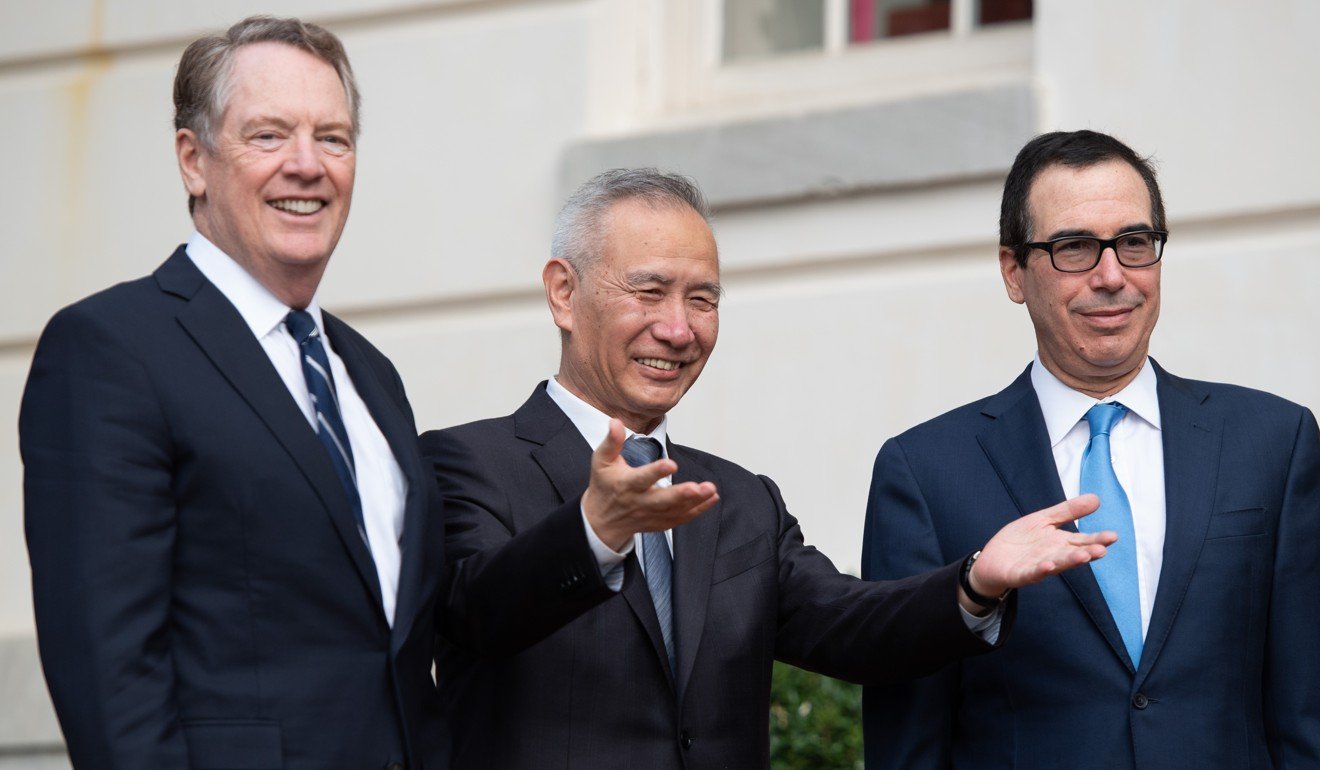Donald Trump’s White House meeting with China’s top trade negotiator raises hopes for partial deal
- Meeting with Vice-Premier Liu He could see new tariffs postponed and may help pave way for face-to-face talks with President Xi Jinping next month
- Analysts say positive signals suggest agreement on areas such as China buying more US goods may be in sight

Hopes of a partial trade deal were rising on Friday as Donald Trump prepared to meet China’s top trade negotiator at the White House at the end of the latest round of talks in Washington.
The key issues will be whether the US president announces that new tariffs – which were due to take effect on Tuesday – will be postponed.
Every detail of Trump’s meeting with Vice-Premier Liu He, which the US President announced on Thursday – such as the interaction between members of the two delegations and their reaction to reporters’ questions, will face intense scrutiny.
Previous meetings at the Oval Office have started with briefings by Liu and his US counterpart, Trade Representative Robert Lighthizer before Trump opened up to questions by journalists.
Should Trump agree to face the media this time, he is likely to face a barrage of questions about other topics – including the Hong Kong protests, the US position on Xinjiang – as well as the impeachment inquiry he faces and the Turkish invasion of northern Syria.
Unlike Trump’s previous meetings with the Chinese delegation, this time Liu does not carry the title of special envoy for President Xi Jinping.
However, the meeting may pave the way for a summit between Trump and Xi on the sidelines of the Asia-Pacific Economic Cooperation leaders’ summit on November 17 in Chile.
Wu Xinbo, director of the Centre for American Studies at Fudan University in Shanghai, said the Trump-Liu meeting indicated the talks may have been going well so far.
“Things have changed from May or July. With fires in his backyard such as the start of the re-election campaign, the impeachment inquiry launched by the Democrats and a slowing economy, Trump wants, more than any time in the past, to reach a deal as soon as possible,” said Wu.

He said the White House meeting may cover issues such as China’s willingness to purchase US goods to help reduce the trade imbalance – the easiest area on which to reach agreement – and intellectual property protection.
“They may also talk about how to implement the deal as the next step,” said Wu.
“As for a Xi-Trump meeting ]next month], it will also depend on what progress the trade teams are able to achieve afterwards, possibly in one more or two rounds of trade negotiations in China. They could try to reach an early agreement before the two leaders meet,” he said.
Tao Wenzhao, a researcher with the Institute of American Studies at the Chinese Academy of Social Sciences, said Washington and Beijing have a clear understanding of each other’s positions after so many rounds of talks.
“A deal is possible but each side is unlikely to give up its own fundamental interests. For China, the issue in question is state-owned enterprises,” said Tao.
“It does not matter whether Vice-Premier Liu is titled Xi’s special envoy or not. The details of the deal should be very clear to each trade team, but it is now the time to make political decisions,” Tao said.
Chinese foreign ministry spokesman Geng Shuang said on Friday that Beijing hoped to achieve progress “on the basis on mutual respect and equality”.
However, Th e New York Times has reported that US officials are considering a wide range of policy options that could further hit China’s economy and force the country to change its economic structures
It said the internal discussion also includes a memo drafted by Mike Pillsbury, an outside adviser to the White House and China specialist at the Hudson Institute think tank.
The options include tighter financial scrutiny of Chinese companies, sanctions against China’s actions in the South China Sea, a crackdown on Confucius Institutes at US universities and fostering closer ties with Taiwan.
It also includes disrupting the flow of capital between Hong Kong and mainland China if it is determined that Hong Kong’s autonomy is not being respected.
Pillsbury told the South China Morning Post that the memo was about options that might need to be considered “only if the trade talks completely fail and break down”.
“This is what advisers to any government are supposed to do – identify and create options that can be used if necessary in different circumstances,” he said.
He stressed the Trump was “completely in charge” of policy decisions about China, adding: “A good trade deal would definitely be the best outcome for both sides.”
Previously Pillsbury had warned that the US could raise punitive tariffs much further if no deal was reached.